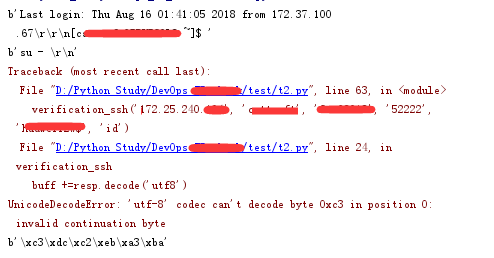需求:python如何實現普通用戶登錄伺服器後切換到root用戶再執行命令 解決參考: 代碼: 遇到問題: 思路:經過檢查發現這個是中文字元集和英文字元集返回密碼格式不同導致的,在代碼中加入:ssh.send(' export LANG=en_US.UTF-8 \n'),即可解決上述問題 因為中文和 ...
需求:python如何實現普通用戶登錄伺服器後切換到root用戶再執行命令
解決參考:
代碼:
def verification_ssh(host,username,password,port,root_pwd,cmd): s=paramiko.SSHClient() s.load_system_host_keys() s.set_missing_host_key_policy(paramiko.AutoAddPolicy()) s.connect(hostname = host,port=int(port),username=username, password=password) if username != 'root': ssh = s.invoke_shell() time.sleep(0.1) ssh.send(' export LANG=en_US.UTF-8 \n') #解決錯誤的關鍵,編碼問題
ssh.send('export LANGUAGE=en \n')
ssh.send('su - \n')
buff = "" while not buff.endswith('Password: '): #true resp = ssh.recv(9999) print(resp) buff +=resp.decode('utf8') print('hhhhh') print(buff) ssh.send(root_pwd) ssh.send('\n') buff = "" # n = 0 while not buff.endswith('# '): # n += 1 resp = ssh.recv(9999) print(resp) buff +=resp.decode('utf8') # print(n) # if n >=3: # break # print(buff) ssh.send('sh /tmp/check/101.sh') #放入要執行的命令 ssh.send('\n') buff = '' # m = 0 while not buff.endswith('# '): resp = ssh.recv(9999).decode() buff +=resp # m += 1 # print(m) result = buff # print(type(result)) # print(result) s.close() if __name__ == "__main__": verification_ssh('測試IP地址', '普通賬號', '普通賬號的密碼', '52222', 'root密碼', 'id')
遇到問題:

思路:經過檢查發現這個是中文字元集和英文字元集返回密碼格式不同導致的,在代碼中加入:ssh.send(' export LANG=en_US.UTF-8 \n'),即可解決上述問題


因為中文和英文字元集轉換不同,所以導致報錯。
補充:由於操作系統字元集中‘LANGUAGE="zh_CN.GB18030:zh_CN.GB2312:zh_CN"’的緣故,即使修改了LANG也是無用的,入下圖


此時還需將LANGUAGE的變數值修改:export LANGUAGE=en




